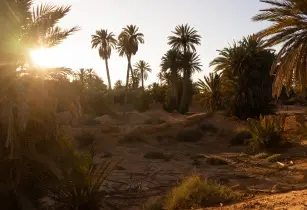Eriteas Ministry of Agriculture (MoA) is promoting date palm plantations in different parts of the country since 2003 and has distributed more than 20,000 seedlings
Began in 2016, the date palm production project has involved the production of seedlings through tissue culture and suckers. It has also included different training programs and workshops, along with awareness raising campaigns for farmers and other institutions throughout the country. Invariably, it has been received with great enthusiasm and encouraged more farmers to take up date palm farming.
According to Mussie Fekadu, head of the biotechnology unit at the National Agricultural Research Institute (NARI) and the National project coordinator of date palm production, the project hopes to reach a satisfactory level of production within five years. In order to achieve this goal, the MoA, in cooperation with various development partners, has organised regular theoretical and practical capacity-building programmes. As a result, researchers at NARI have been able to multiply the date palm through embryogenesis.
The main sites of the project are the Northern and Southern Red Sea regions (NRS and SRS). Plantation of date palms began in 2017 with 2000 quality seedlings imported through the assistance of the FAO. The seedlings planted in Foro, Afabet, Shieb, Massawa, Gahtelay (all located in the NRS region) are progressing well. Besides, seedlings were distributed to farmers in the SRS region, with the beneficiaries similarly making the project a success in their areas. So far, Arata, Assab, Southern, and Northern Danakalia areas are involved in the project.
According to Mussie, date palm cultivation offers many potential benefits. The propagation of date palm using tissue culture techniques can help increase production of high quality and healthy plants across large parts of the country in a shorter period of time.
He added that micro-propagation of date palms has been carried out at NARI’s tissue culture laboratory through somatic embryogenesis. The explants have been propagated through callus, embryo multiplication, shooting, and rooting stages. This technique usually takes 27 to 29 months to complete the process from shoot tip to plantlets of date palm. Parallel to this, in the last four years more than 5,700 vitro-plants of date palm, from nine international varieties, were introduced, hardened, and distributed to local farmers.
The MoA, with the support of the FAO and IFAD, acquired the vitro-plants from a leading tissue culture laboratory in Dubai. To ensure hardening, they were kept in a nursery in Massawa for at least six months before transplanting.
Members of the public relations team of the MoA recently visited different project sites and conducted interviews with beneficiaries and experts in the NRS and SRS regions.
Date Palm Production in the Northern Red Sea region
According to Daniel Kesete, head of the horticulture unit in the NRS region, the cultivation of date palm in the region began in 1996, led by two exemplary farmers: Mr. Abdallah Swalah from Sheeb and Mr. Melake Gebrekrstos from Dogoli.
Daniel gave some background, explaining, “Initially, production started with seedlings prepared from date palm seeds. Subsequently, the Ministry of Agriculture brought seedlings from aboard in 1999. Not long after, the newly-introduced varieties were distributed to beneficiaries. Unfortunately, due to different challenges, the initiative didn’t find great success until 2017.”
Date Palm Cultivation at Household Level
Abraham Tesfamariam, an urban gardener, lives in Massawa. He has two date palm trees on his land, with the seedlings being provided by the MoA in January 2021. Importantly, he has benefited from technical guidance offered by experts in the region and, although still early, his plants are in good condition.
Abraham believes that date palms offer a range of economic, environmental, and aesthetic benefits, and he looks forward to more training from the MoA so that he can better manage his date palm trees.
A group of ten veteran fighters, all of whom are employed in a bakery in Massawa, came together to plant seven date palm trees in January 2021.
According to Tsigereda Gaim, one of the group’s members, the group had already been involved in planting trees around their homes, mainly for shade. After hearing about the importance and many benefits of date palms, the group wanted to try them out.
Other members of the group expressed their appreciation for the extensive support provided by the MoA and noted their desire for more training or learning opportunities.





